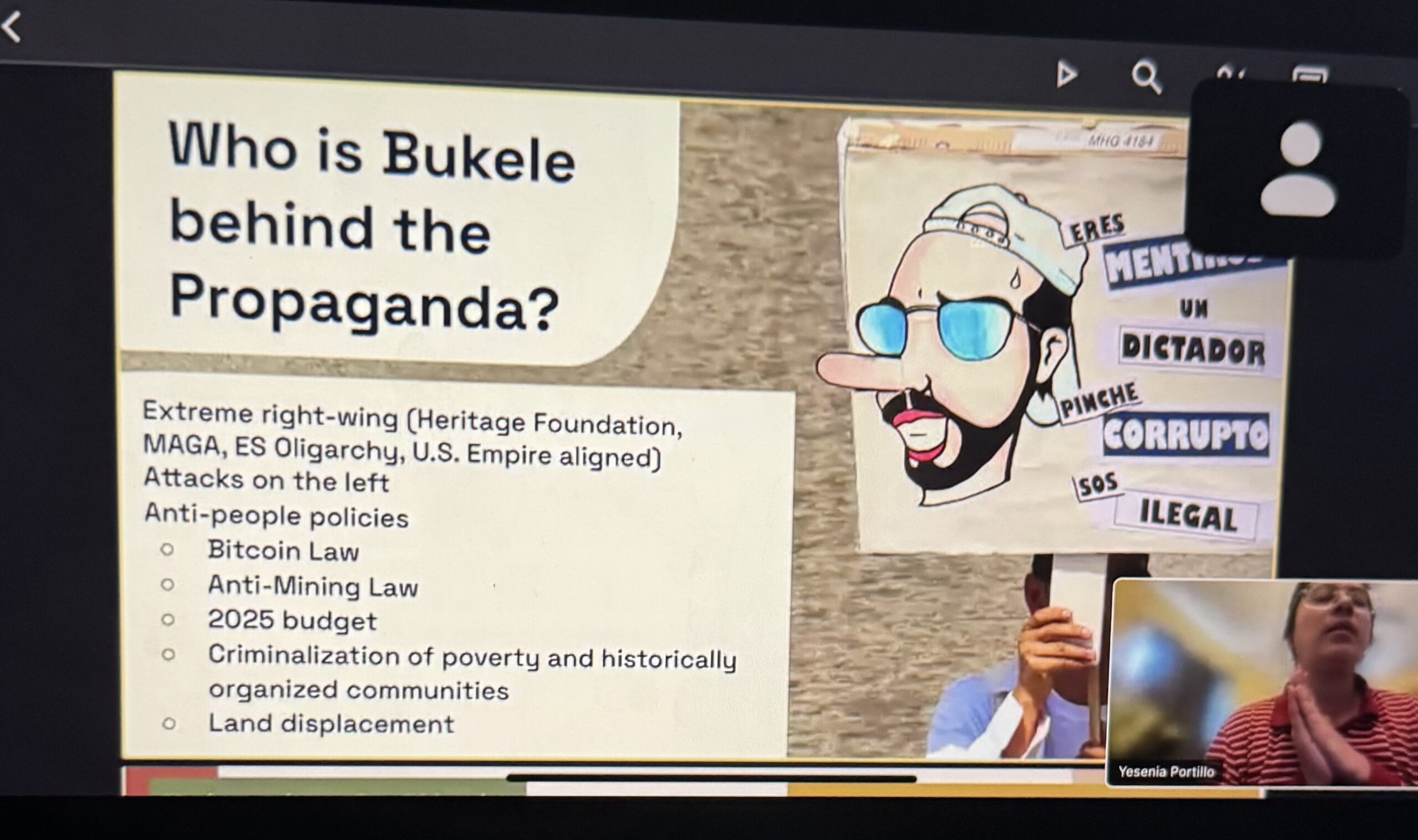On February 27th, we were joined via webinar by Yesenia Portillo, director of CISPES (Committee in Solidarity with the People of El Salvador) for the first talk of CLAIR’s Central American Studies Lab. Danny Sanchez-Bravo, PhD Student in Chicana/o Studies, moderated, and Dr. Giovanni Batz was a fellow discussant with Yesenia. Thank you to everyone who facilitated and attended this talk live!
Nayib Bukele was re-elected the president of El Salvador last year in spite of constitutional term limits, following his first election to the country’s highest office in 2019. Yesenia made clear the ways in which Bukele has wielded power far beyond what the presidency entails, including his engagement in political persecution and the criminalization of poverty.
Bukele’s authoritarianism threatens decades of democratic progress in El Salvador. Following the Chapultepec Peace Accords in 1992, ending the brutal civil war, certain reforms were put in place to transition from military dictatorship and protect human rights. Under Bukele, the ideal of an impartial judicial system has given way to arbitrary detentions and overcrowded prisons. The Guerra Contra Pandillas, in practice a State of Emergency maintained since 2022, has given pretense to suspend the freedom to assemble, right to privacy, and access to a lawyer, while those arrested are detained for months on end. Yesenia is part of an organizing movement that aims to call the president out for his overreach, though CISPES’s advocacy predates Bukele’s regime.
CISPES dates back to the 1980s as an example of solidarity across Central America, and especially among Central American and Salvadoran migrants. They operate from Washington, D.C. to influence U.S. policy and prevent corporate intervention in El Salvador; in the 80s, they rallied against U.S. funded massacres and death squads, but today they stand with the Salvadoran peoples’ right to economic and social justice across many other issues. Yesenia joined the group in 2014, specifically the Radical Roots Delegation in their struggle to prevent mining that threatens El Salvador’s fragile ecosystems.
Bukele’s government overturned a historic mining ban, one of his many “anti-people” policies. Land displacements and increases in national security and communication budgets at the expense of other social programs have also occurred since his election in 2019. Yesenia characterized Bukele as an extreme right-wing politician. Associating himself with the U.S. Empire at large, Bukele has ties to the Heritage Foundation (the architects of Project 2025), Donald Trump, Tucker Carlson, and the MAGA movement.
While Bukele’s propaganda succeeds in maintaining his high approval ratings, innocent people have found themselves victimized by his authoritarian tendencies. Tens of thousands of people have gone behind bars without any due process; meanwhile, prison authorities outright ignore court orders for certain releases, humanitarian or otherwise. On February 25th, Fidel Zavala, a spokesperson for UNIDEHC (Human and Community Rights Defense Unit) was arrested as well as 20 community leaders from La Floresta. Zavala is an outspoken critic of human rights abuses in the prison system that he witnessed firsthand, before his recent arrest. Zavala’s arrest has been condemned by Amnesty International in the days following Yesenia’s talk as they and many others call for his release.
Resistance to authoritarianism takes many forms, from grassroots movements in El Salvador to the activism of CISPES in the United States. Yesenia articulated just how difficult it can be for leftist organizing to take place under the threat of active repression. She gave a wonderful talk tackling these issues, in light of Bukele’s authoritarianism masquerading as populism. Thank you once again to Yesenia Portillo for a powerful and timely discussion.

